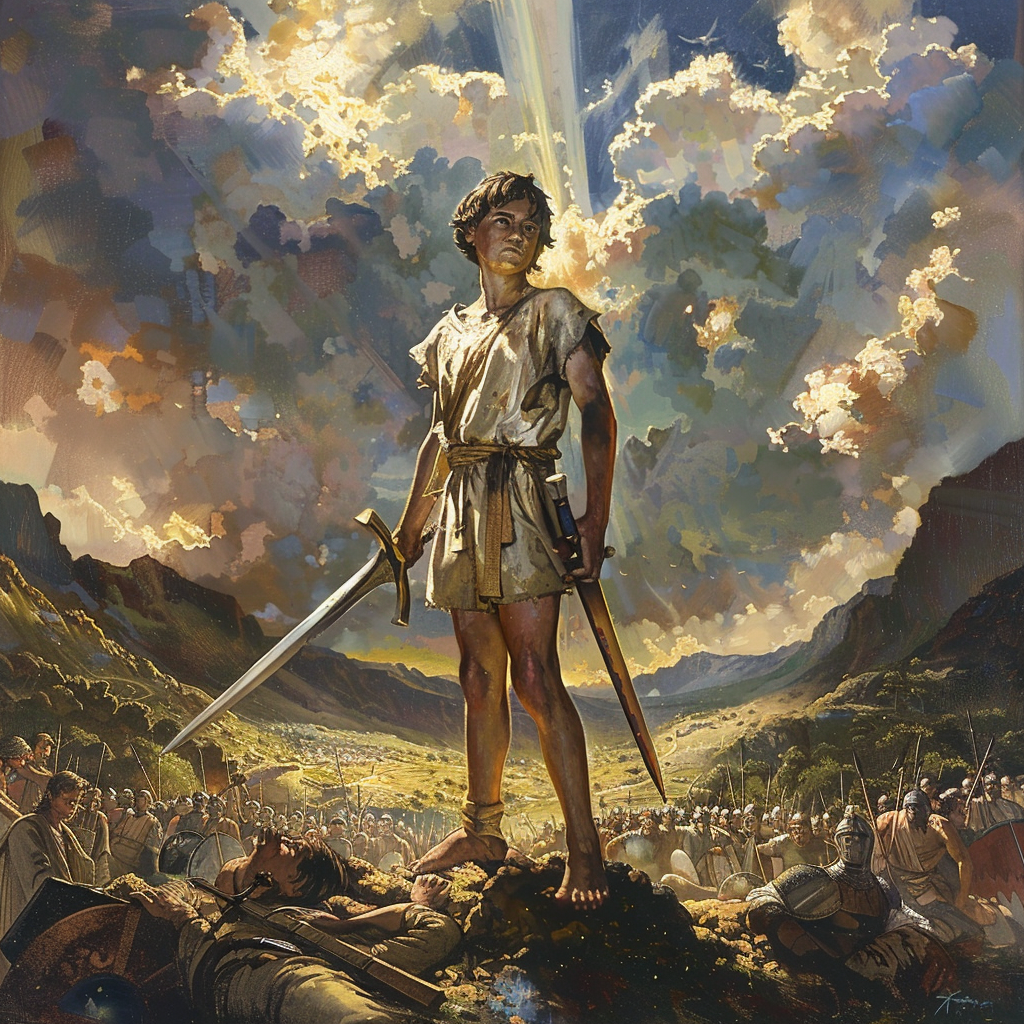
Part 1: The Call to Battle
In the rolling hills of Bethlehem, I, David, tended to my father’s sheep. The days were long but peaceful, the nights filled with the songs of the stars. Yet, I felt a stirring in my heart, a call to something greater than the life of a shepherd.
One morning, my father Jesse called me aside. “David,” he said solemnly, “your brothers are with King Saul’s army, facing the Philistines. Take this food to them and see how they fare.”
As I approached the battlefield, the sight before me was overwhelming. The Israelite army stood on one hill, the Philistines on another, with the Valley of Elah between them. And then I saw him—a giant of a man, Goliath of Gath, standing over nine feet tall, clad in bronze armor, his voice booming as he challenged Israel.
“Choose a man to come down and fight me!” Goliath roared. “If he kills me, we will be your subjects. But if I kill him, you will be our subjects and serve us.”
Fear gripped the Israelites’ hearts, but something else stirred within me—an unshakable faith and courage. I knew that the God of Israel was with us.
Poem: The Call to Battle
In the valley where shadows loom,
Where warriors’ hearts face certain doom,
A shepherd boy with faith so strong,
Hears the call and sings his song.
For giants fall and fear must flee,
When courage stands with faith to see,
That God above, in His great might,
Gives strength to those who choose the fight.
Part 2: Facing the Giant
As I approached my brothers, I heard their murmurs of fear and saw their downcast eyes. “Why do you let this Philistine defy the armies of the living God?” I asked, my voice filled with anger.
Eliab, my eldest brother, scolded me. “Why have you come down here? And with whom did you leave those few sheep in the wilderness? I know your pride and the insolence of your heart.”
Ignoring his rebuke, I turned to the others. “Let no one’s heart fail because of him; your servant will go and fight this Philistine.”
Word of my boldness reached King Saul, and he sent for me. “You are not able to go against this Philistine to fight with him, for you are but a youth, and he has been a warrior from his youth,” Saul said.
But I recounted my experiences as a shepherd, how I had faced lions and bears, and the Lord had delivered me from their paws. “The Lord who delivered me from the paw of the lion and the paw of the bear will deliver me from the hand of this Philistine.”
Saul, seeing the determination in my eyes, reluctantly agreed. He offered me his armor, but I declined. Instead, I took my staff, chose five smooth stones from the brook, and with my sling in hand, I approached the giant.
Part 3: The Battle Begins
Goliath saw me coming and laughed, his voice echoing through the valley. “Am I a dog that you come to me with sticks?” he sneered. “Come to me, and I will give your flesh to the birds of the air and the beasts of the field.”
But I stood firm, my heart anchored in faith. “You come to me with a sword, spear, and javelin, but I come to you in the name of the Lord of hosts, the God of the armies of Israel, whom you have defied. This day, the Lord will deliver you into my hand, and I will strike you down and cut off your head. And I will give the dead bodies of the host of the Philistines this day to the birds of the air and the wild beasts of the earth, that all the earth may know that there is a God in Israel.”
With a roar of rage, Goliath advanced. I ran toward him, reaching into my bag for a stone. Placing it in my sling, I swung it around my head and let it fly. The stone struck Goliath on the forehead, and he fell face down.
Poem: The Battle Begins
With courage bold and faith so grand,
A shepherd boy makes his stand.
Against the giant’s taunting might,
He steps forth into the fight.
A single stone, a simple sling,
In his heart, a song to sing.
For in his hand, with God’s own grace,
A giant falls, pride laid to waste.
Part 4: Victory and Aftermath
The battlefield fell silent as the mighty Goliath lay motionless. I rushed forward, drawing the giant’s sword, and with a single stroke, I severed his head. The Philistines, seeing their champion defeated, fled in terror. The men of Israel and Judah arose with a shout, pursuing them and securing a great victory.
Returning to King Saul, I presented him with Goliath’s head. The king, his eyes wide with amazement, asked, “Whose son are you, young man?”
“I am the son of your servant Jesse the Bethlehemite,” I replied.
The victory was not mine alone; it was a testament to the power of faith and the might of the God of Israel. The people celebrated, and my name spread throughout the land.
Symbolism and Insights:
Goliath represents our seemingly insurmountable challenges, while David’s faith and courage symbolize the strength of trusting in God. The stone and sling are symbols of divine simplicity—God often uses the humble and ordinary to achieve extraordinary results.
Poem: Victory and Aftermath
With God’s strength, a stone did fly,
A giant fell, his might did die.
In the valley where fear had grown,
A shepherd’s faith was clearly shown.
The victory won, the people praised,
A young man’s name in honor raised.
For faith and courage, pure and bright,
Can turn the darkness into light.
Part 5: The Legacy of Giants
As I reflected on the battle and the victory, I thought about the giants of old—the Nephilim, mentioned in the ancient texts. These giants were said to be the offspring of the “sons of God” and the “daughters of men,” mighty men of renown. Goliath was a remnant of that ancient lineage, a reminder of the challenges that have always tested humanity.
In defeating Goliath, I realized that we had overcome both a physical and a spiritual giant. The victory was a declaration that even the greatest obstacles can be conquered with faith.
Symbolism and Insights:
The Nephilim symbolize the ancient and enduring struggles between good and evil, faith and doubt. Goliath’s defeat signifies the triumph of divine power over the forces of darkness, reminding us that belief in God can lead to victory no matter how daunting the challenge.
Part 6: The Return of Giants
In my later years, I often wondered if the giants might return. The Nephilim were not just physical beings; they represented the spiritual battles humanity would continue to face. As the king of Israel, I knew that our nation would face many more trials, but I also knew that with God’s guidance, we could overcome them.
Symbolism and Insights:
The potential return of giants symbolizes the ongoing spiritual warfare that believers must navigate. It reminds us to remain vigilant in faith and trust in God’s power to protect and deliver us from all forms of evil.
Poem: The Legacy of Giants
In ancient days, the giants roamed,
Their power and might, by fear well-known.
Yet faith and courage, bold and bright,
Can turn the darkest day to light.
With sling and stone, a shepherd’s hand,
Brought peace and hope to a troubled land.
For giants fall and fears must flee,
When faith in God sets our hearts free.
Conclusion: A Tale of Faith and Courage
The story of David and Goliath is a timeless tale of faith, courage, and divine intervention. It reminds us that no matter how great the challenge, God is with us, and with His help, we can overcome any obstacle. The legacy of giants, both physical and spiritual, continues to inspire us to trust in God and to face our battles with unwavering faith.
No tags for this post.



